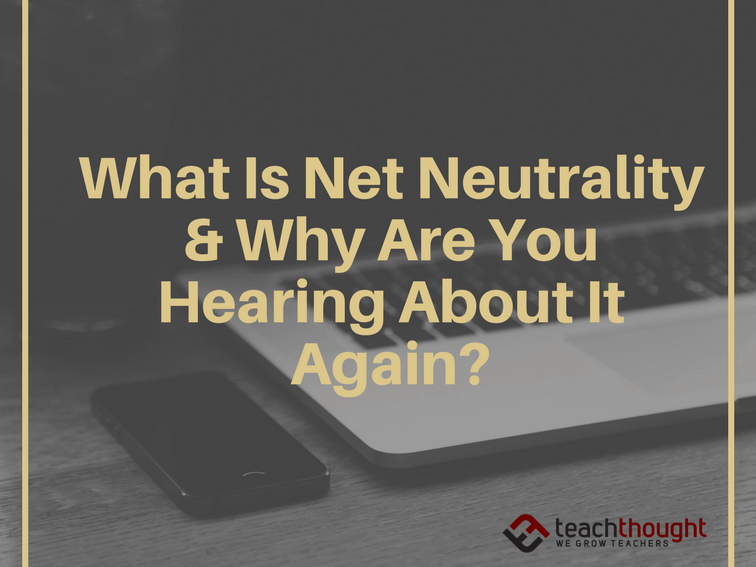What Is Net Neutrality & Why Are You Hearing About It Again?
by Terry Heick
What is net neutrality?
Net neutrality is, put briefly, the idea that all digital content should be equally accessible by everyone.
That is, content is value-neutral, i.e., subjectively valuable, and the control of its access should not be manipulated, especially by the government, large corporations, or groups with lobbying power or ‘special interests.’
That’s the theory anyway. Google ‘pagerank’ factors, paid search results, the rise of ‘SEO’ (Search Engine Optimization), lack of broadband and hardware access in socioeconomically-suppressed communities and dozens of other factors long ago made the idea of a truly ‘open net’ impossible.
And Google would certainly count as a ‘large corporation,’ as would facebook, a company who itself has gone on record as seeking to replace the internet entirely. That makes the idea of neutrality ring a bit hollow for some. That, however, is a bit of a sidebar in the current context of renewed threats to any kind of neutrality at all.
A Brief History Of Net Neutrality
Net neutrality has been an issue since the ‘net’ became, well, a ‘thing’–and the issue has never truly gone away. Just have a look at the Wikipedia references for the topic.

Back in 2008, Google defined net neutrality as,
“Network neutrality is the principle that Internet users should be in control of what content they view and what applications they use on the Internet. The Internet has operated according to this neutrality principle since its earliest days….Fundamentally, net neutrality is about equal access to the Internet. In our view, the broadband carriers should not be permitted to use their market power to discriminate against competing applications or content. Just as telephone companies are not permitted to tell consumers who they can call or what they can say, broadband carriers should not be allowed to use their market power to control activity online. Today, the neutrality of the Internet is at stake as the broadband carriers want Congress’s permission to determine what content gets to you first and fastest. Put simply, this would fundamentally alter the openness of the Internet.”
The Recent History: From 2015-Present
The history of net neutrality has remained remarkably consistent.
In 2015, Tomsguide.com, a long-standing expert technology resource and community, defined the issue in light of access to recreational media, explaining that, ‘(t)he rise of data-intensive streaming media services such as Netflix, and the concentration of power in large Internet service providers such as Comcast and Verizon, have raised questions of how Internet access will be parceled out and paid for among content providers and consumers.”
The concern has a variety of applications, from software pirating, wikileaks, and government corruption, to movie streaming, answering questions ranging from “When will my Netflix stop buffering?” to “Will the Internet remain an egalitarian, democratic environment?”‘
Former United States President Barack Obama spoke at length on the issue when it was threatened in 2014.

You can read more about the recent history of net neutrality. Ultimately, under pressure from public response, the FCC acquiesced, (temporarily) maintaining net neutrality.
The Current Net Neutrality Concern: Why You’re Hearing About It Again
Though Title II of the Communications Act was passed, in part, to ensure net neutrality, the issue persists.
And thus, the concern remains the same: a) Who can disrupt net neutrality, b) why should the average person care about it, and c) what should you, specifically, do in response?
The short answers are a) FCC Chairman Ajit Pai–a former lawyer for Verizon!–and the FCC under the Trump Administration, b) because in any democratic society, information access absolutely must never, ever be shaped by corporate interests or government influence and c) for starters, you can go let the FCC know what you think.
Comedian and talk show host John Oliver even went so far as to register the domain gofccyourself.com and auto-forward it correct page for commenting, explaining “Do not tell me you do not have time to do this,” Oliver implored his fans. “If the internet is evidence of anything else, it’s evidence that we all have too much time on our hands.”
If you want to read more, head over the savetheinternet.com. Further, educate your students; help them understand what it is and how it affects them, and how they can get involved to protect their own interests and digital citizens depending on the internet and its quality, access, and neutrality.
Then we can get on with promoting always-on broadband access for everyone, everywhere–and the ability and wont for critical thinking and citizenship when it’s put to use.


